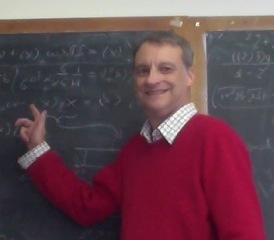There is a joke told about Werner Heisenberg and Erwin Schrödinger out for a country drive one sunny morning. Heisenberg is pulled over for speeding and the traffic officer asks him, “Sir, do you know how fast you were traveling?” Heisenberg replies, “No, officer, but I know exactly where I am!” The officer looks quite confused and declares, “Sir, you were driving at over 150 km in a residential zone!” Heisenberg throws his arms up and cries in despair, “Oh splendid! Now I'm lost!” The officer, now even more confused and frustrated, orders the men out of the car and proceeds to inspect their vehicle. He opens the trunk and yells at the two men, “Hey! Did you fellows know you have a dead cat back here?” Schrödinger angrily yells back, “Well, now we do, you fool!”
It takes some minimal acquaintance with physics to understand that joke, limiting the overall breadth of its appeal. But it’s not rocket science, and a reasonably well-educated person should be able to explain (or to understand) the premise behind the joke in a straightforward manner. As a matter of fact, rocket science need not be “rocket science” if we as science educators are doing our jobs properly. Let me explain.
At NCSE we are in the business of helping educators deliver sound science teaching, particularly with respect to evolution and climate change. From long experience we know that while some of our “flare-ups” spring from ideological commitments to biblical literalism, others spring essentially from inadequate science education. Some people don’t really understand at a basic level how the scientific method works or what the goals and objectives of scientific research are. Some people are afraid of science, perhaps because they grew up with a family prejudice against it or had rather boring experiences with it in school.
Clear and engaging communication by scientists could go a long way toward dispelling public misapprehensions. By way of example, let me recount a r ecent experience of exemplary communication in science. As a graduate of Oxford University, I receive notices of periodic events sponsored by the northern California branch of the Oxford University Society (OUS). On November 11, the OUS sponsored a talk, which I attended, by Dr. John Wheater, Chair of the Physics Department at Oxford. As an added bonus, Arno Penzias, the co-discoverer of cosmic background radiation, was in the audience, and I had a chance to meet and talk with him at length.
ecent experience of exemplary communication in science. As a graduate of Oxford University, I receive notices of periodic events sponsored by the northern California branch of the Oxford University Society (OUS). On November 11, the OUS sponsored a talk, which I attended, by Dr. John Wheater, Chair of the Physics Department at Oxford. As an added bonus, Arno Penzias, the co-discoverer of cosmic background radiation, was in the audience, and I had a chance to meet and talk with him at length.
In the course of an hour, Dr. Wheater offered an exposition of the nine broad research themes engaged in by the hundreds of faculty, research assistants, post-docs, and graduate students in the Oxford Department of Physics. The themes were particle physics, astrophysics and planetary physics, plasmas, quantum optics and quantum computers, biological physics, climate physics, photovoltaics, quantum materials, and accelerator physics. Wheater spoke intelligibly about each area and its relevance both for the quest for knowledge and for addressing urgent human concerns such as climate change.
What I found most impressive about this presentation—beyond the clear exposition of the content areas themselves—was that Dr. Wheater nicely tailored his talk to the anticipated interests and backgrounds of an audience of non-physicists. OUS members include lawyers, politicians, entrepreneurs, clergy, artists, writers, and physicians, as well as a range of scientists. As one who is not a professional scientist myself, I found that Wheater not only lucidly sketched the technical scientific details but also presented compellingly the case for why funding science is of fundamental importance to a flourishing society.
I told Dr. Wheater about the kinds of science denial we encounter at NCSE. I asked him how we might bridge the gap between the worldview of people trained in physics that he had so clearly sketched, and that of the creationists and climate change deniers we encounter in our work. His answer came in two parts. First, he said rather bluntly that it might be a matter of waiting for scientifically illiterate people to die and be replaced by a better-educated younger generation. This would be a passive approach, and also somewhat despairing.
But more importantly from my perspective, Dr. Wheater talked passionately about the need for better communication about science by scientists themselves. He said that on average th e Oxford University Physics Department is called upon about every other day throughout the year to give presentations on scientific topics in school classes, museum programs, and meetings of community groups. A lot of this outreach is done by graduate students as part of their training alongside their academic work. Wheater indicated that Oxford University takes very seriously the matter of improving the public understanding of both scientific theory and the application and utility of scientific research.
e Oxford University Physics Department is called upon about every other day throughout the year to give presentations on scientific topics in school classes, museum programs, and meetings of community groups. A lot of this outreach is done by graduate students as part of their training alongside their academic work. Wheater indicated that Oxford University takes very seriously the matter of improving the public understanding of both scientific theory and the application and utility of scientific research.
NCSE applauds the active approach to improving science communication through public outreach by scientists. If we can dispel any anxieties young people may have about science, we might be able to instill in them an eagerness to engage in learning about the physical and biological world. We may just find that opposition to evolution and climate science decreases as people become more accustomed to clear science communication.
